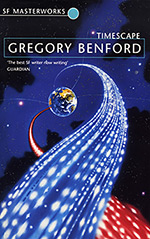
![]() Sable Aradia
Sable Aradia
12/30/2017
![]()
Read for the 12 Awards in 12 Months Reading Challenge, the Apocalypse Now! Reading Challenge, and the SF Masterworks Reading Challenge and the Science Fiction Masterworks Book Club.
Method of the world's destruction: A major failure of chemical balance in the oceans, mostly caused by an overabundance of hydrocarbons, overwhelms the ecosystem and leads to a toxic ocean bloom.
This book won the BSFA, Campbell and Nebula Awards (1981).
I am fascinated by the mixed reviews of this book! Overall the enjoyment of it seems to depend upon whether the reader understands the science behind it. I do not have a background in physics, but I do have an amateur's appreciation for the workings of astrophysics and the flow of deep time, so this might have had a bearing. And personally, I loved it!
There are two concurrent plot threads that Benford follows. Written in 1980, this book postulates a future ecological disaster, and the work of physicists attempting to use tachyons to send a message into the past, in the hopes that doing so will change the course of events. Benford also follows the flow of the physicists in the past with whom they have made contact as they attempt to understand and interpret what has happened to an otherwise simple physics experiment.
Much of the novel is concerned with the social and political workings of the scientists. The team of the future faces constant constraints in their work due to top-down limitations imposed by a council who allocate scarce resources to what they view as the "most practical" science dealing with the disaster; and this physics experiment is (perhaps rightfully) viewed as a long shot. The lead physicist in the past must contend with the resistance of his scientific community and administrators, who dislike his results and view the idea of a "message" sent from somebody with incredulity, and they make an active effort to discredit his work. I imagine it's interesting to some people to understand that scientists are themselves human, dealing with all their innate flaws and prejudices, and to realize how much of our understanding of science depends on flawed human beings doing their best.
Some critiques. First, I found it very slow to start with and hard to get into, but once I had done so and understood the nature of the drama, I was engrossed.
Second, a modern reader like myself may find the casual sexism and racism distracting, though I wouldn't call it a deal-breaker. We tend to think of 1980 as a modern time that follows women's liberation, but evidently we were not that liberated yet. As a Jewish scientist, the physicist of 1968 is viewed with unconscious distrust and suspicion that is not even explained by the author, probably because it was so ubiquitous at the time. And women are bookends to the men who are the movers and shakers of the drama. It rankles on me how the 1968's protagonist's girlfriend, who is also faculty (though in the English department) is expected to come home and make dinner for the great scientist after a hard day's work (like hers is any less hard.) And even in 1998, the other end of things, women are mostly wives who have no other purpose (there are peripheral female scientists in both times, but they are exceptions and hardly mentioned.) I think it best to view both timelines as alternate histories, with corresponding differences in culture, in order for this to be palatable, and that works well with the way the book resolves (though I won't tell you any more because that would be an awful spoiler.)
But as I said, this is still an awesome read, well worthy of its place as a SF Masterwork, and I would highly recommend it to all fans of the genre.
http://dianemorrison.wordpress.com